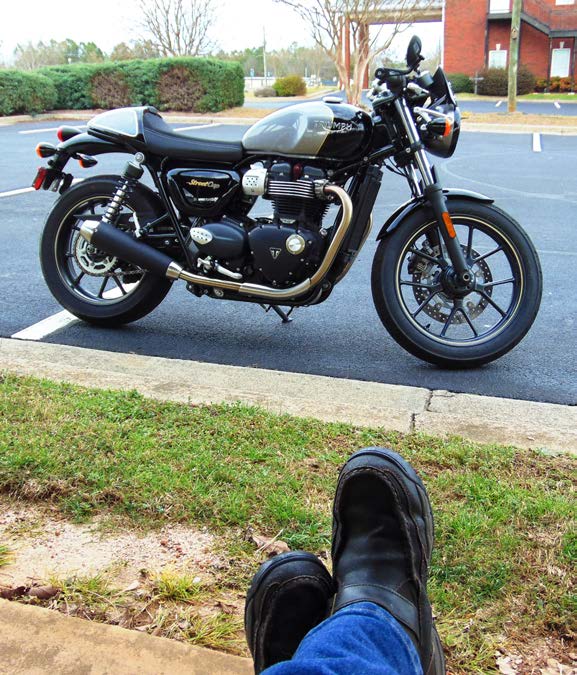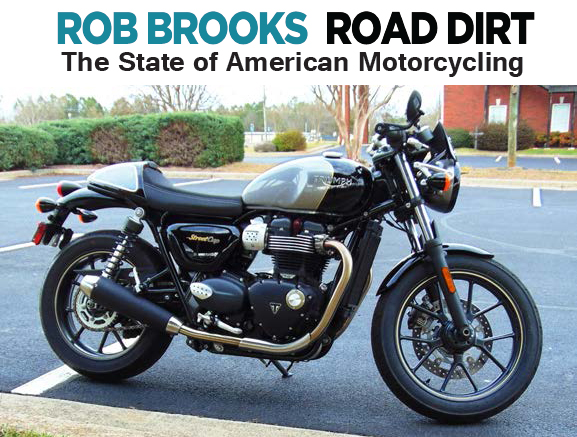The State of American Motorcycling – Rob Brooks Road Dirt
Much has been written and discussed in recent years about the apparent decline of motorcycling in America. Sales have been down over the last decade or so. Baby Boomers are beginning to age out of riding, and yet their children, the Millennials, aren’t flocking to dealerships as previous generations did. Harley-Davidson has posted quarterly sales declines for about a year and a half, and most other major brands, domestic and import, have felt the pinch of decreased showroom traffic. Much hand-wringing has ensued as a result, with some bemoaning the future death of our sport – riding replaced with driverless automobiles and highways, Uber and Lyft- style services becoming the norm, and expanded rapid transit forcing motorcycling into some impending extinction.
In the past year, further evidence of motorcycling’s slow slide was said to be observed with the sudden death of Victory Motorcycles, an announcement that shocked us all. Polaris’ reasons were actually understandable, as they chose to focus R&D and marketing on the legendary Indian brand. EBR (Erik Buell Racing) shut down operations, again, which was not as surprising. Even MV Augusta, the boutique Italian sportbike brand, has found itself in and out of bankruptcy the past few years. And yet, Triumph has posted record U.S. sales in 2016 and 2017, with the reimagining and re-engineering of their Bonneville line. As I’ve stated before, they seem to have their finger on the pulse of the American rider, young and old.
Industry insiders and outsiders agree that more can be done to grow motorcycle riding in America. Robert Pandya started the “Give a Shift” Initiative, a forum to discuss the health and future of the Powersports industry. AMA has been generating dialogue over effectively passing our sport on to the next generations. And the big brands are showing signs of awakening, realizing that slapping some fresh paint and accessories on old models won’t bring in flocks of new riders. New and revived brands are positioning themselves to grab market share, such as Royal Enfield, Hyosung, Ural, Husqvarna, even Janus (built in Goshen, Indiana) among others, all building appealing machines for the next generation.
I’ve given this some thought myself and would like to offer some suggestions from my observations – for the industry, and for us as passionate riders.

To the motorcycle industry:
We are not in the 1980s anymore. Gone are the days of assuming “If you build it, they will come” (apologies to “Field of Dreams”) or “race on Sunday, sell on Monday.” I remember in my youth when everyone from Harley to Honda advertised on TV, in magazines and newspapers, and even on billboards. Just marketing in motorcycle publications won’t cut it – you’re “preaching to the choir” so to speak. Go grab the attention of potential riders, like you used to in decades past.
Build bikes that are approachable, appealing, and affordable to new or returning riders. There’s a reason Indian sells so many Scouts and Scout 60s. They aren’t huge, heavy and intimidating, they aren’t the price of a small car, and they evoke a nostalgia younger generations want to connect with. They are but one example. Harley’s Iron 88 is a big seller, the entire Triumph Bonneville line moves as do Ducati’s Scrambler models and BMW’s RnineT offerings, not to mention the Japanese “Big Four” with cool, retro-styled bikes, all under 1000cc and many under $10,000. Build more of those, market them, and future generations will walk through your doors.
To the Riders of America:
There are many reasons we ride. We talk about these among ourselves, in our riding groups, and in the moto-media we consume.
But when was the last time we invited someone to visit a local bike shop or dealership with us? Or attend a bike night or rally event with us? Or volunteered to attend a motorcycle safety course together? A new Lightspeed Data study cited in Powersports Business revealed that in 2017, Millennials comprised 36% of all bike sales, new and used, at an average of $8,500 per bike, with Generation X riders not far behind. That is promising, but we must “keep the throttle pinned” by discussing and demonstrating our wonderful world of motorcycling at every opportunity. Millennials will ride, Gen Xers are returning to the fold, and the emerging Gen Z (18-under) can catch the fever as well. Let’s be contagious.
May the future of motorcycling in America be bright.

